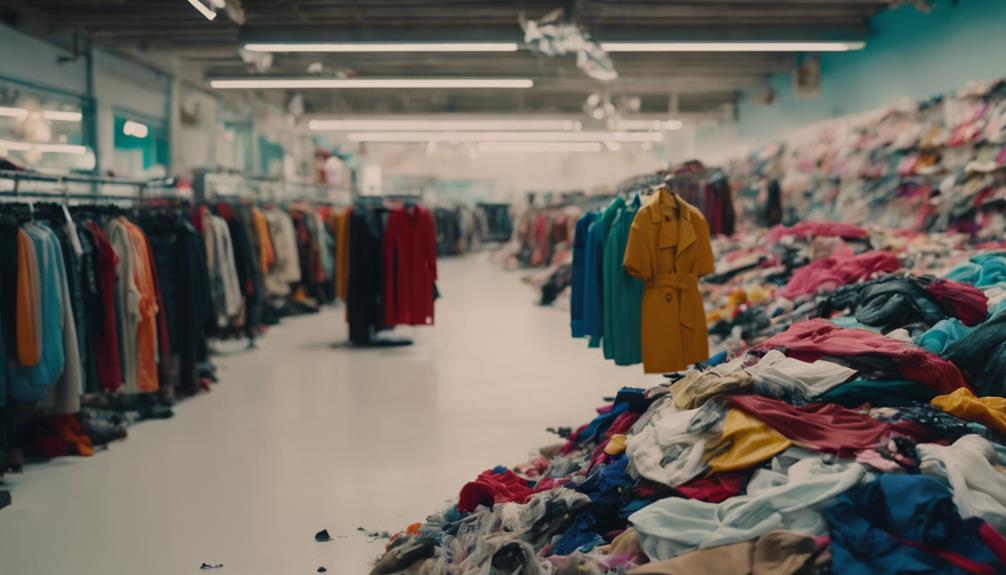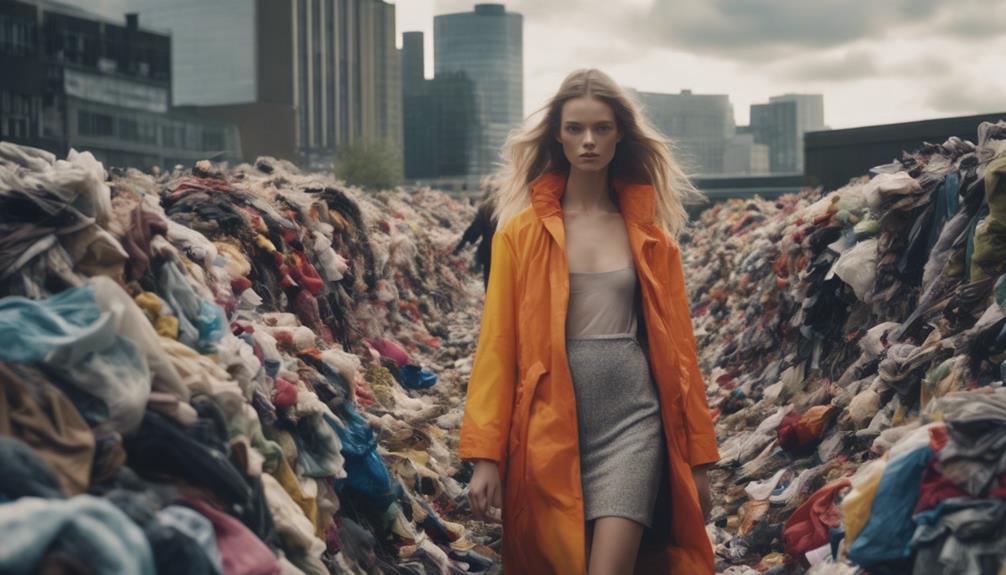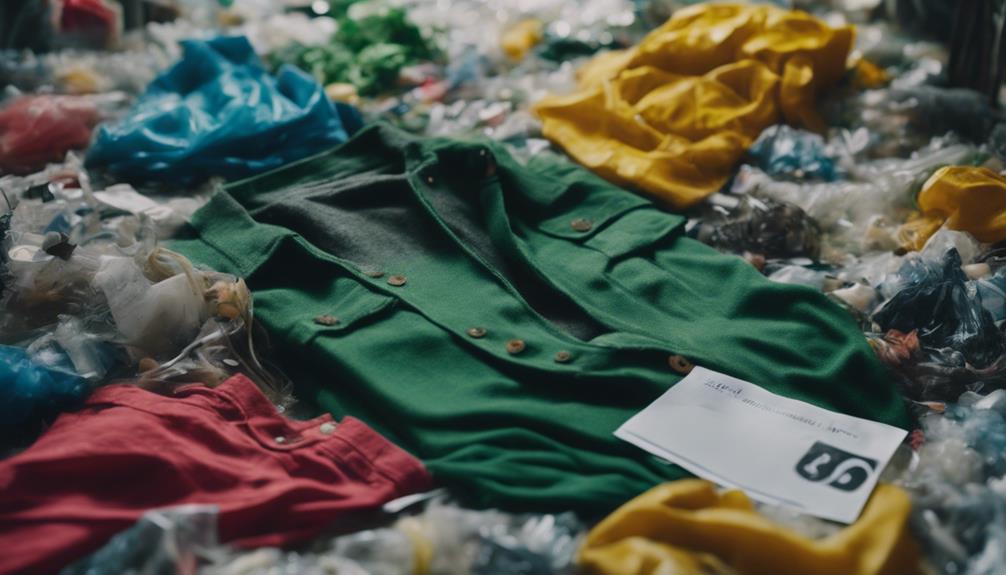Sustainable fashion is not a contradiction; it is a necessary response to the harmful practices of the fashion industry. While fast fashion relies on overproduction and cheap labor, sustainable fashion promotes eco-friendly practices and ethical labor conditions. It prioritizes quality over quantity, urging you to invest in lasting pieces rather than passing trends that end up in landfills. By supporting sustainable brands, you are not just making a purchase; you are making a statement that pushes corporations to improve. You may be surprised at how your choices can inspire systemic change in this industry. There is a lot more to explore about this vital topic.
Key Takeaways
- Sustainable fashion focuses on eco-friendly practices and ethical labor, countering the harmful effects of the fast fashion industry.
- Fast fashion's overproduction and waste contribute significantly to greenhouse gas emissions, challenging the notion of sustainability in mainstream fashion.
- While some brands claim sustainability, many overlook critical emissions and exploit cheap labor, raising questions about their true commitment.
- Consumer choices play a vital role in driving demand for sustainable practices, pushing brands toward more responsible production methods.
Defining Sustainable Fashion
Sustainable fashion focuses on creating clothing that prioritizes eco-friendly practices and ethical labor, challenging the fast fashion industry's harmful impact on the environment. By shifting your focus to sustainable fashion, you contribute to reducing the environmental impact of an industry responsible for about 5% of global greenhouse gas emissions. This movement emphasizes quality over quantity, urging you to invest in durable, high-quality garments that stand the test of time.
Mindful consumption becomes essential in this situation. Instead of frequently purchasing from fast fashion brands, you can choose to buy less and select items that align with sustainable values. Supporting small-scale production and independent designers not only fosters a more responsible fashion industry but also helps stimulate systemic change. This shift from mass-produced items to thoughtful purchases reduces excessive waste and pollution.
While sustainable fashion presents a more ethical alternative, it's important to remain aware of contradictions that can arise, as the rapid pace of fashion often contradicts its principles. However, by embracing these ideals and making conscious choices, you can play an important role in promoting a healthier planet and a more equitable industry.
The Fast Fashion Dilemma

Fast fashion lures consumers with its constant stream of trendy, inexpensive clothing, but this comes at a steep environmental cost. The industry thrives on overproduction, releasing new collections every six weeks, which leads to a staggering one-third of annual clothing production ending up in landfills unsold.
While you might think you're scoring great deals, fast fashion brands are responsible for significant greenhouse gas emissions—80% of which come from the manufacturing process. This rapid turnover of trends fuels excessive consumerism, contributing to an estimated 5% of global manmade greenhouse emissions.
Even brands that tout sustainable practices often use recycled materials linked to fossil fuels, failing to truly address their environmental impact. Although major fast fashion retailers like Primark pledge to use sustainable materials by 2030, these commitments often overlook the critical emissions generated during garment production.
As you consume fashion, it's crucial to reflect on these realities. Sustainable brands offer a viable alternative, but the allure of fast fashion can make it hard to resist. Recognizing the true cost of your clothing choices is the first step toward a more sustainable future.
Consumer Choices and Impact

Considering the environmental impact of your clothing choices can lead to more responsible consumption patterns and promote a healthier planet. As a consumer, your choices can greatly influence the fashion industry. With over one-third of shoppers now considering social and environmental impacts, there's a growing movement towards sustainable fashion. This shift reflects a realization that the industry contributes around 5% of global manmade greenhouse emissions, underlining the urgency of mindful consumption.
By supporting eco-friendly brands, you can help drive change within the industry. Historical boycotts show how collective consumer action can pressure corporations to adopt responsible practices. Engaging in mindful habits, like prioritizing high-quality items or participating in clothing swaps, also reduces your environmental footprint and fosters a culture of sustainability.
Social media plays an essential role in this transformation, increasing your exposure to brands' practices and creating demand for transparency. When you choose to share your values online, you not only hold companies accountable but also inspire others to make more sustainable choices.
Your consumer choices matter, and together, you can make a considerable impact on the future of fashion.
Exploitation in the Fashion Industry

While making mindful clothing choices can foster positive change, the dark reality of exploitation in the fashion industry reveals the urgent need for systemic reform. The fast fashion model thrives on cheap labor and unsafe conditions, which directly impacts millions of workers. The 2013 Rana Plaza disaster tragically exposed these flaws, leading to the deaths of over 1,100 individuals.
The exploitation within the fashion supply chain is alarming, as it often prioritizes profit over ethical labor practices. Workers face harassment, low wages, and unsafe environments, underscoring the social and environmental impact of your clothing choices.
Here's a brief overview of the exploitation in the fashion industry:
| Aspect | Details |
|---|---|
| Wages | Often below living standards |
| Working Conditions | Unsafe and unsanitary environments |
| Labor Rights | Frequently violated, with little recourse |
| Global Inequality | Wealth extraction from the Global South |
As you navigate the world of sustainable fashion, remember the importance of addressing these exploitation issues to create a truly ethical industry.
Envisioning a Sustainable Future

Envisioning a sustainable future in fashion demands a commitment to eco-friendly materials and ethical production methods that prioritize both people and the planet.
To tackle climate change and guarantee a healthier environment, you need to support sustainable fashion initiatives that promote a circular fashion model. This approach minimizes waste and optimizes resources throughout the supply chain.
Here are some key strategies to reflect upon:
- Embrace eco-friendly materials: Choose brands that use organic, recycled, or biodegradable fabrics to reduce environmental impact.
- Practice responsible purchasing: Invest in high-quality, timeless pieces instead of fast fashion, which contributes to waste and exploitation.
Frequently Asked Questions
Is Sustainable Fashion an Oxymoron?
You might think sustainable fashion's impossible, given fast fashion's dominance. However, it isn't an oxymoron. With conscious choices and ethical brands, you can support a shift towards a more sustainable and responsible fashion industry.
Is Sustainability an Oxymoron?
You might think sustainability's an oxymoron, but it isn't. While challenges exist, embracing eco-friendly practices and responsible consumption can create a balance. With effort, you can help drive meaningful change in various industries.
What Is the Problem With Sustainable Fashion?
The problem with sustainable fashion lies in brands' superficial practices, lack of transparency, and continued high-volume production. You'll find many claim sustainability while ignoring systemic issues, making genuine progress difficult and misleading for consumers.
What Is the Paradox of Sustainable Fashion?
The paradox of sustainable fashion lies in its promise of eco-friendliness while perpetuating overconsumption. You'll notice brands market sustainability, yet often ignore systemic issues, creating a disconnect between what they claim and what they practice.
Conclusion
You might think sustainable fashion is an oxymoron, but here's the twist: every choice you make can tip the balance. From choosing to buy from brands that prioritize ethical and eco-friendly practices to supporting second-hand and upcycled fashion, there are numerous ways to make a positive impact. That’s why sustainable fashion matters – because the fashion industry is one of the most polluting and exploitative industries in the world, and every small choice we make can contribute to changing that. By educating ourselves and making conscious decisions, we can help shift the industry towards a more sustainable and ethical future.
By opting for eco-friendly brands or second-hand treasures, you're not just wearing clothes; you're weaving a narrative of change.
Imagine stumbling upon a vintage piece that sparks a conversation and inspires others.
Coincidentally, your fashion choices could ripple through the industry, proving that sustainability isn't just a trend—it's a movement you're part of.
Embrace it!









